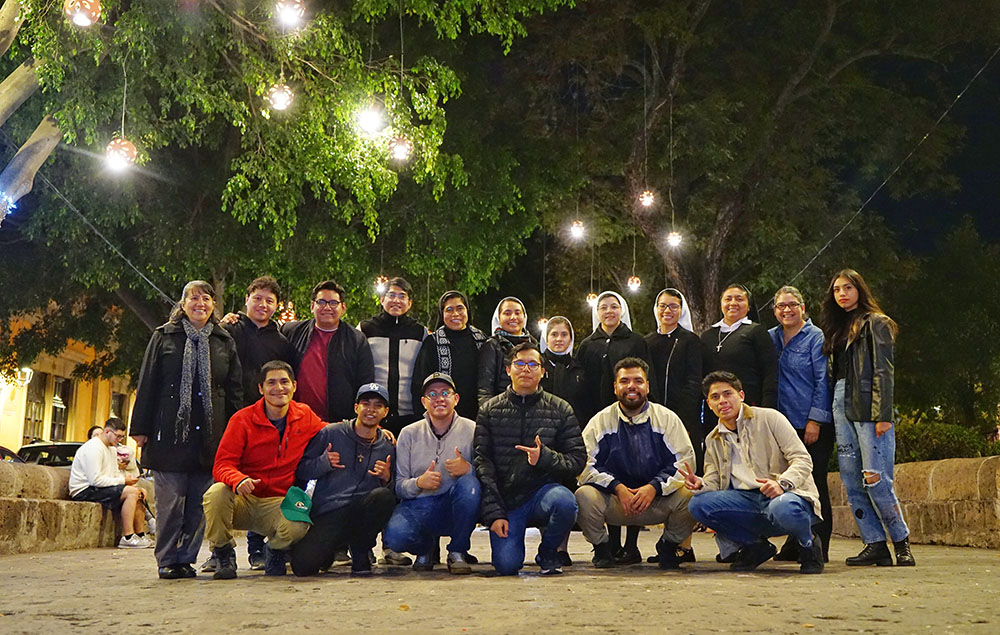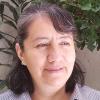
A group of young adults and members of the Verbum Dei Missionary Fraternity on a pilgrimage to the Sanctuary of Our Lady of Guadalupe in Morelia, Mexico (Courtesy of Asaid Castro)
This year, I had the privilege of accompanying children, young people, adults and members of the Verbum Dei Missionary Fraternity on a pilgrimage to the Sanctuary of Our Lady of Guadalupe in Morelia, Mexico. Though the original image of Our Lady is in the Basilica in Mexico City, the church in Morelia is widely acclaimed as one of the most beautiful in the country and is a frequent site of pilgrimage.
As we walked through downtown Morelia, I observed the faces of the people there. I saw faces full of hope, understanding, surprise and amazement. I sensed that they might wonder: How could this group of people have the audacity to go on a pilgrimage on a Sunday afternoon to a shrine? And, at the same time, I could see the smiles and welcoming looks of the people as we passed.
I felt they connected with us, allowing themselves to be touched by our songs and be flooded with joy. How could there be such a deep connection if we did not know each other? Deep down, we are all pilgrims; we are all on a journey searching for a goal, a dream or an ideal. As human beings, we are born with the capacity for exodus, for going out of ourselves to love, help, welcome and receive.
I felt a sense of solidarity with the people along the way, and with those who leave their countries searching for a better place to live. I believe humanity is one big caravan, constantly moving from one stage to the next, from one discovery to the next, and from one style to the next.
Advertisement
Indeed, all human beings are on the way, regardless of age, social status, race, language or nation. Human beings, from conception on, are open to change and growth and, at birth, go through the first great exodus that will accompany them until their last days.
We are walkers, and life is a path to walk, although sometimes obstacles like cold and darkness prevent us from moving forward.
How many people in this COVID-19 pandemic have lost the enthusiasm and joy for opening new routes of peace, dialogue and forgiveness? How many pilgrims have yet to find their goal or fulfill the hopes that led them to set out on the road?
I ask myself: What about me as a missionary? And what do we, in consecrated life, want to offer to all those who are tired of walking in their lives, who find themselves wounded, stretched and devoid of illusions along the way? What can we, as consecrated women, offer to the millions of people who continue to leave their homes in the hope of a new dawn?
I am excited, and I desire to live "on the way," knowing that I have not achieved everything, that I can continue to learn, that I can grow every day, and that I am called to respect and value the dignity of others.
What do I wish for this year, 2023? What routes do I want to take? I want to be constantly on the move, to build bridges to get closer to the marginalized and those who need to be heard and to have hope. Being a pilgrim is our personal seal; it is the mark we leave at every step that many can follow.
We are made to explore new territories, expand our horizons, and share the hopes and fears of others.
It is true that when we connect with this deep identity in our hearts, the call to set out on a journey is renewed — to live in constant exodus, to love, to forgive and to serve. As the Spanish poet Antonio Machado says, "Caminante, no hay camino, se hace camino al andar" ("Traveler, there is no path; the path is made by walking").
We are made to explore new territories, expand our horizons, and share the hopes and fears of others. We cannot cover our hearts with stainless steel on this path of life, because we have been called to live in solidarity, allowing ourselves to be touched by the suffering and pain of people we encounter.
Did not Jesus of Nazareth walk along the roads? He went from town to town, announcing peace. May 2023 be a year of exploring new paths and sharing our bread with others. We value the footprints that others have left so that we can move forward on the same path.
At the end of the pilgrimage to the shrine of Guadalupe, several people joined us with a grateful look as if to say, "Thank you, because I also wanted to walk."
After all, we are pilgrims; what we leave behind is our way of loving, being present, and reflecting on the person we are called to be.
And you, what footprints do you want to leave? What paths will you open? What crosses or baggage will you carry?







